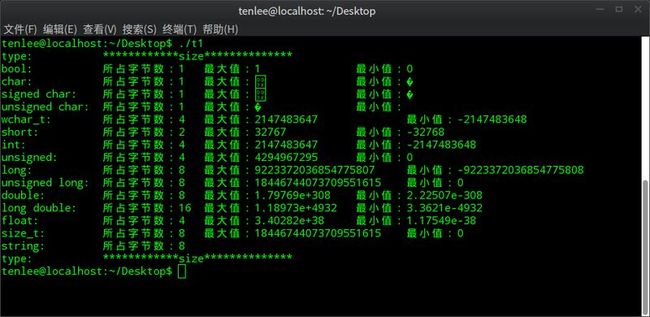int、long、long long, double, long double取值范围
unsigned int 0~4294967295
int 2147483648~2147483647
unsigned long 0~4294967295
long 2147483648~2147483647
long long的最大值:9223372036854775807
long long的最小值:-9223372036854775808
unsigned long long的最大值:1844674407370955161
__int64的最大值:9223372036854775807
__int64的最小值:-9223372036854775808
unsigned __int64的最大值:18446744073709551615
1 #include<iostream> 2 #include<string> 3 #include <limits> 4 using namespace std; 5 6 int main() 7 { 8 cout << "type: \t\t" << "************size**************"<< endl; 9 cout << "bool: \t\t" << "所占字节数:" << sizeof(bool); 10 cout << "\t最大值:" << (numeric_limits<bool>::max)(); 11 cout << "\t\t最小值:" << (numeric_limits<bool>::min)() << endl; 12 cout << "char: \t\t" << "所占字节数:" << sizeof(char); 13 cout << "\t最大值:" << (numeric_limits<char>::max)(); 14 cout << "\t\t最小值:" << (numeric_limits<char>::min)() << endl; 15 cout << "signed char: \t" << "所占字节数:" << sizeof(signed char); 16 cout << "\t最大值:" << (numeric_limits<signed char>::max)(); 17 cout << "\t\t最小值:" << (numeric_limits<signed char>::min)() << endl; 18 cout << "unsigned char: \t" << "所占字节数:" << sizeof(unsigned char); 19 cout << "\t最大值:" << (numeric_limits<unsigned char>::max)(); 20 cout << "\t\t最小值:" << (numeric_limits<unsigned char>::min)() << endl; 21 cout << "wchar_t: \t" << "所占字节数:" << sizeof(wchar_t); 22 cout << "\t最大值:" << (numeric_limits<wchar_t>::max)(); 23 cout << "\t\t最小值:" << (numeric_limits<wchar_t>::min)() << endl; 24 cout << "short: \t\t" << "所占字节数:" << sizeof(short); 25 cout << "\t最大值:" << (numeric_limits<short>::max)(); 26 cout << "\t\t最小值:" << (numeric_limits<short>::min)() << endl; 27 cout << "int: \t\t" << "所占字节数:" << sizeof(int); 28 cout << "\t最大值:" << (numeric_limits<int>::max)(); 29 cout << "\t最小值:" << (numeric_limits<int>::min)() << endl; 30 cout << "unsigned: \t" << "所占字节数:" << sizeof(unsigned); 31 cout << "\t最大值:" << (numeric_limits<unsigned>::max)(); 32 cout << "\t最小值:" << (numeric_limits<unsigned>::min)() << endl; 33 cout << "long: \t\t" << "所占字节数:" << sizeof(long); 34 cout << "\t最大值:" << (numeric_limits<long>::max)(); 35 cout << "\t最小值:" << (numeric_limits<long>::min)() << endl; 36 cout << "unsigned long: \t" << "所占字节数:" << sizeof(unsigned long); 37 cout << "\t最大值:" << (numeric_limits<unsigned long>::max)(); 38 cout << "\t最小值:" << (numeric_limits<unsigned long>::min)() << endl; 39 cout << "double: \t" << "所占字节数:" << sizeof(double); 40 cout << "\t最大值:" << (numeric_limits<double>::max)(); 41 cout << "\t最小值:" << (numeric_limits<double>::min)() << endl; 42 cout << "long double: \t" << "所占字节数:" << sizeof(long double); 43 cout << "\t最大值:" << (numeric_limits<long double>::max)(); 44 cout << "\t最小值:" << (numeric_limits<long double>::min)() << endl; 45 cout << "float: \t\t" << "所占字节数:" << sizeof(float); 46 cout << "\t最大值:" << (numeric_limits<float>::max)(); 47 cout << "\t最小值:" << (numeric_limits<float>::min)() << endl; 48 cout << "size_t: \t" << "所占字节数:" << sizeof(size_t); 49 cout << "\t最大值:" << (numeric_limits<size_t>::max)(); 50 cout << "\t最小值:" << (numeric_limits<size_t>::min)() << endl; 51 cout << "string: \t" << "所占字节数:" << sizeof(string) << endl; 52 // << "\t最大值:" << (numeric_limits<string>::max)() << "\t最小值:" << (numeric_limits<string>::min)() << endl; 53 cout << "type: \t\t" << "************size**************"<< endl; 54 return 0; 55 }
一字节表示八位,即:1byte = 8 bit;
int: 4byte = 32 bit 有符号signed范围:2^31-1 ~ -2^31即:2147483647 ~ -2147483648无符号unsigned范围:2^32-1 ~ 0即:4294967295 ~ 0
long: 4 byte = 32 bit 同int型
double: 8 byte = 64 bit 范围:1.79769e+308 ~ 2.22507e-308
long double: 12 byte = 96 bit 范围: 1.18973e+4932 ~ 3.3621e-4932
float: 4 byte = 32 bit 范围: 3.40282e+038 ~ 1.17549e-038
int、unsigned、long、unsigned long 、double的数量级最大都只能表示为10亿,即它们表示十进制的位数不超过10个,即可以保存所有9位整数。而short只是能表示5位;
http://blog.csdn.net/tenlee/article/details/44997015
